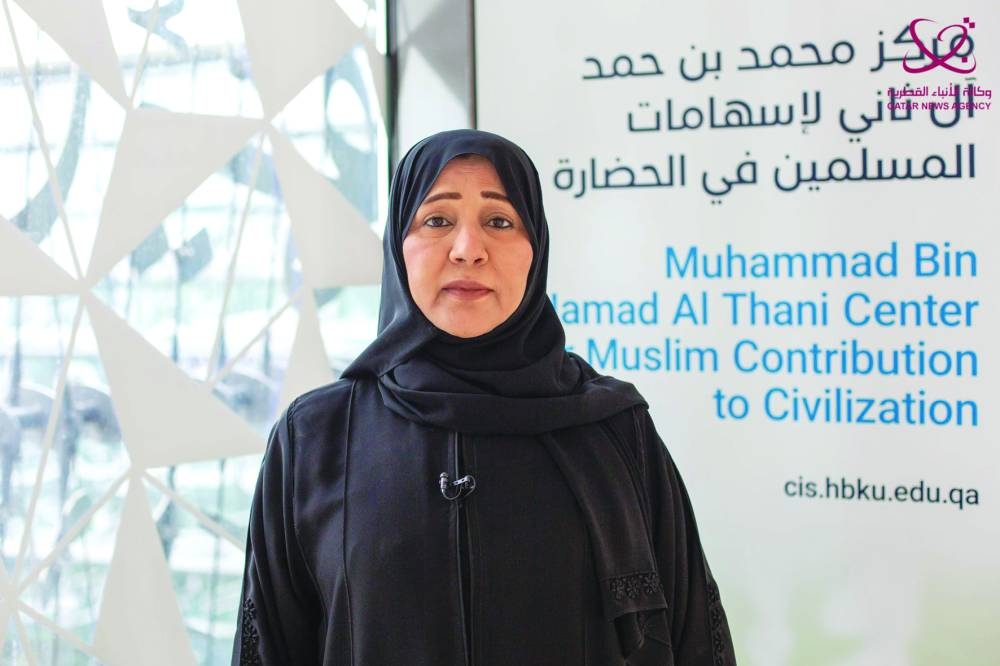The director of the Muhammad Bin Hamad Al Thani Centre for Muslim Contribution to Civilisation at Hamad Bin Khalifa University (HBKU), Dr Aisha Yusuf al-Mannai, has stressed that the holy month of Ramadan is an opportunity to deepen understanding of Islamic civilisation and its historical contributions, through lectures and seminars on the cultural and scientific heritage of Muslims.
In an interview with the Qatar News Agency (QNA), Dr al-Mannai said that the spiritual atmosphere that characterises the month of Ramadan provides an ideal environment to enhance awareness of the importance of Islamic heritage, and to present a comprehensive picture of Islamic civilisation, which has contributed with its scientific and intellectual achievements to the development of humanity throughout the ages.
The College of Islamic Studies professor said that the Muhammad Bin Hamad Al Thani Centre for Muslim Contribution to Civilisation was established in response to the urgent need to correct misconceptions about Islam, and to highlight the unique contributions made by Muslims in various fields of knowledge.
Dr al-Mannai added that Sheikh Mohammed bin Hamad al-Thani established the centre in 1983, when he was the minister of education, with the aim of translating the most important Islamic books into English, out of his belief in the importance of intellectual communication between peoples and cultures.
The centre was then transferred in 2010 to the College of Islamic Studies.
Dr al-Mannai said that the centre plays a pivotal role in preserving and disseminating Islamic heritage globally by translating Islamic works into different languages, organising scientific conferences and seminars, and supporting researchers in the fields of Islamic civilisational contributions.
She also spoke on the role of translation in spreading Islamic cultural knowledge.
Translation, Dr al-Mannai said, is one of the most prominent tools that contributed to conveying Islamic thought to the world.
She said that the centre works on translating books into major languages, such as English, French, German, Turkish, and Chinese, which helps in spreading Islamic knowledge on a wider scale and enhancing cultural dialogue between cultures.
Dr al-Mannai revealed that there are future plans to expand the scope of the translated books series, to include a long list of scientific works covering the fields of medicine, astronomy, pharmacy, and engineering, in addition to the humanities and intellectual sciences.
She elaborated that a specialised global scientific committee developed this list, and that the centre is working to implement it.
Dr al-Mannai noted that the centre is also focused on verifying rare Islamic manuscripts, publishing summaries of key works on Islamic civilisation, and organising scientific conferences and seminars to foster knowledge exchange.
She also touched upon the centre's impact on correcting the stereotype of Islam and Muslims.
The centre's activities, Dr al-Mannai said, aim to correct misconceptions about Islam and reaffirm its role as a religion that contributes to building human civilisation.
She also noted that the centre seeks to instill confidence in Muslim youth about their faith and cultural heritage, viewing Islam as a religion that encompasses both material and spiritual life.
Islamic civilisation, Dr al-Mannai stressed, is inseparable from the biography of the Prophet Muhammad (PBUH), as it forms the foundation of various fields and aspects.
Based on this understanding, the centre organises an annual conference focused on studying the Prophet's biography from different perspectives.
This year, the conference highlighted the Prophet's stance on war and peace.
Dr al-Mannai praised the role of Qatar in supporting efforts aimed at reviving Islamic heritage and enhancing civilisational dialogue between peoples.
She noted that the centre aspires to become a global platform for studies and research on the contributions of Muslims to civilisation.

Dr Aisha Yusuf al-Mannai
